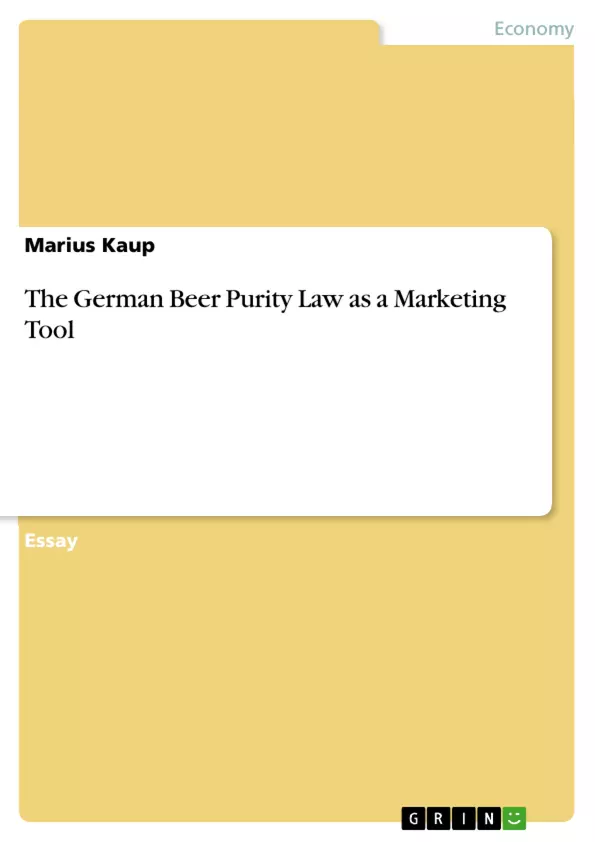In 2016 the existence of the German purity law for beer recorded its 500th anniversary. Taking into account the massive advertising campaigns around the German purity law, not only concerning the 500th anniversary, but also in everyday media, the questions arise, how this law, considering today’s technology improvements throughout the world, can still be an indicator for superior quality and why this law might also be seen as a clever Marketing Tool.
Inhaltsverzeichnis (Table of Contents)
- The German Beer Purity Law
- More of a Marketing Tool than a Sign of Quality
- The German Beer Purity Law is Nowadays Rather a Clever Marketing Tool, Than a Sign of Quality
- The German Beer Purity Law is Not Necessarily a Synonym for Purity
- The German Beer Purity Law Provides the Excellent Opportunity to Distinguish German Breweries from Their International Competitors
Zielsetzung und Themenschwerpunkte (Objectives and Key Themes)
This essay analyzes the German Beer Purity Law, examining its historical significance and its modern-day role as a marketing tool. The essay explores the law's impact on consumer perception, its influence on the production of beer, and its relevance in the global market.
- The history and evolution of the German Beer Purity Law
- The effectiveness of the law as a quality indicator for beer
- The role of the law in marketing and advertising strategies
- The impact of the law on consumer behavior and purchase decisions
- The future of the German Beer Purity Law in a globalized market
Zusammenfassung der Kapitel (Chapter Summaries)
- The essay begins by outlining the historical background of the German Beer Purity Law, highlighting its 500-year history and its significance in German legislation.
- It then dives into the main argument, challenging the notion that the purity law serves as a guarantee of quality in beer. It examines the perceived benefits of the law and analyzes how it is used as a marketing tool by German breweries.
- The essay explores the production processes of German breweries, demonstrating that the use of natural ingredients is not always a priority. It examines the use of additives and processing aids, suggesting that the purity law is not as restrictive as it is perceived to be.
- The essay concludes by discussing the international impact of the purity law and its role in promoting German beer abroad. It highlights the importance of advertising and lobbying efforts in maintaining the law's influence.
Schlüsselwörter (Keywords)
The primary keywords and focus topics of the essay are: German Beer Purity Law, quality, marketing, advertising, consumer perception, global market, production process, ingredients, additives, lobbying, brewery industry. The essay explores the historical and contemporary relevance of the law in relation to these key themes.
Frequently Asked Questions
What is the German Beer Purity Law (Reinheitsgebot)?
It is a regulation dating back to 1516, stating that beer should only be brewed using water, barley, and hops (yeast was added later).
Is the Purity Law still a guarantee of superior quality?
While perceived as a quality sign, modern technology allows for various processing aids and additives that may not strictly align with the 'pure' image the law suggests.
How is the law used as a marketing tool?
German breweries use the law's 500-year history to distinguish themselves from international competitors and to suggest a natural, 'pure' production process.
Does the law restrict the use of all additives?
The essay argues that the law is not as restrictive as consumers perceive, as certain additives and processing aids are still used in modern industrial brewing.
Why was the 500th anniversary in 2016 significant?
It was used for massive advertising campaigns to reinforce the brand of 'German Beer' globally and to influence consumer purchase decisions through tradition.
- Citar trabajo
- Marius Kaup (Autor), 2015, The German Beer Purity Law as a Marketing Tool, Múnich, GRIN Verlag, https://www.grin.com/document/498845



